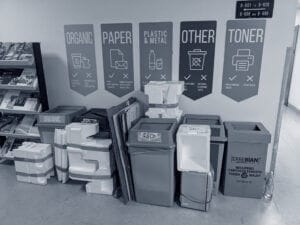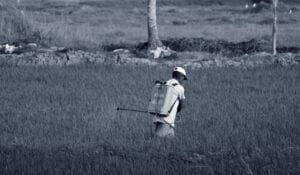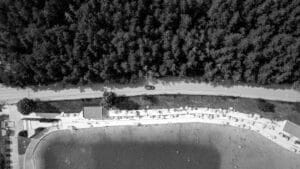Supporting U.S. Cities to Reduce Greenhouse Gas Emissions
HIGHLIGHTS
- As part of the American Cities Climate Challenge (ACCC), ideas42 collaborated with city partners across the U.S. to design behaviorally informed programs that increase public transit use and encourage energy efficiency.
- Our portfolio of projects highlights the many uses of the behavioral science toolkit across climate issues and shows the potential for achieving significant impact at scale.
The Challenge
Cities are significant drivers of emissions that contribute to climate change. Globally, urban areas account for over 70% of all carbon emissions. Though U.S. cities may appear to be tiny dots on the map, they are home to over 80% of Americans and, thus, a significant source of carbon emissions. To mitigate the climate crisis, we need to reduce urban emissions.
Fortunately, U.S. cities are also at the forefront of developing innovative solutions. While progress at the federal and state levels has often proven slow, cities lead the country in piloting, legislating, and implementing novel mitigation programs and policies. Cities can develop novel strategies that deliver significant impact quickly because there is often a stronger political will for environmentally friendly policies. Cities also benefit from centralized decision-making and opportunities for scale. For example, San Jose, California, offers municipally controlled 100% renewable electricity to residents, and Minneapolis created home energy efficiency “scorecards” for prospective buyers.
To support emissions mitigation at the city level in the United States, Bloomberg Philanthropies launched the American Cities Climate Challenge (ACCC) in 2018. The Climate Challenge provides capacity and resources to 25 U.S. cities to allow them to speed up their progress in reducing emissions, particularly in the building and transportation sectors.
Our Approach
Changing behavior plays a central role in reducing emissions in these sectors, from encouraging people to make cost-effective and even profitable improvements to home energy efficiency to supporting them to change their commutes to more environmentally friendly transit modes. That is why ideas42 joined the Climate Challenge. As part of the Climate Challenge, we collaborated with city partners and engaged in capacity building to equip them with a behavioral lens in myriad ways, and designed programs that increase public transit use and encourage energy efficiency.
Results
Despite some disruptions due to the ongoing COVID-19 pandemic, our work with partners across seven cities—Boston; Columbus, Ohio; Minneapolis; Portland, Oregon; Philadelphia; San Jose; and Washington, D.C.—showed promising results.
Capacity Building
We helped city partners build the capacity to leverage behavioral insights to address problems in various formats. During office hours, we helped cities and their partners anticipate behavioral challenges tactically and ensured that materials and programs incorporate behavioral best practices. Our monthly workshops covered specific topics, such as how best to build incentives into city programs or remove hassle factors to improve outcomes. Our challenge-wide workshop in June 2020 engaged city teams over several days to think deeply about incorporating ideas from behavioral science into their work. We also developed a workbook to help city partners use gamification appropriately to encourage behavior change.
In Portland, Washington D.C., and San Jose, we held weekly training sessions on behavioral design to tackle current transportation challenges, including bike parking, using slow streets (streets with lower speed limits and signs encouraging bike and pedestrian use), and more. Participating city staff built the skills to apply the process independently in future projects and changed the administration of current projects.
Beyond capacity-building efforts, we partnered directly with several cities on projects to uncover behavioral bottlenecks preventing city residents from taking on a range of environmental behaviors and implemented behaviorally informed solutions for the identified barriers.
Increasing Public Transit Use
- In partnership with the Boston Transportation Department, we designed a program to help people use environmentally friendly modes of transportation more easily. Demand for the program exceeded expectations, with more than 4,000 applications for 1,000 spots. The results of the program are found here.
- The City of Columbus, ideas42, and the Capital Crossroads Special Improvement District partnered to develop a multipronged plan to increase participation in the C-PASS Program, which offers free bus pass for eligible downtown employees and increases ridership for those who have the pass. After interviewing more than 100 employees in the downtown area, we worked with several downtown businesses to design a transit orientation for new employees in the downtown district, a personalized goal setting and travel plan, and a peer outreach program within participating organizations. Implementation will occur once the COVID-19 safety guidelines allow a return to work, and they can take advantage of the insights and designs in the future.
- We partnered with the Portland Bureau of Transportation (PBOT) to support Portlanders who choose to walk, bike, or ride transit instead of driving alone. In conjunction with the city’s Rose Lane Project—an effort to rapidly deploy transit priority tools to speed up bus trips—we designed a behavioral intervention strategy to activate these new bus lanes. Although postponed by COVID-19, we created a tool kit to send text message reminders and a free bus pass to nearby residents, capitalizing on the “fresh start effect” of a faster and improved transit journey. During the pandemic, we pivoted and worked with PBOT to design and launch the Go By Greenways scavenger hunt. This gamification campaign encouraged people to try out new neighborhood greenways on foot or by bike in one of Portland’s most diverse neighborhoods. The campaign reached 99,300 people and generated more than 1,000 text entries in the five-week program. ideas42 and PBOT also engaged in shorter ‘sprint’ projects, including helping develop a new way to get more people signed up for SmartTrips (PBOT’s individualized marketing program promoting sustainable transit options) and increasing responses to PBOT’s Safe Routes to School program survey.
Opting into Renewable Energy Sources and Encouraging Energy Efficiency
- We diagnosed behavioral barriers that prevent San Jose residents from opting up to the city’s 100% renewable energy program, then designed and user-tested interventions to increase opt-in rates. We delivered final designs for different mailers and updates to the program website.
- We supported Minneapolis’ rollout of home energy disclosure reports, which give prospective buyers information about a home’s relative energy efficiency and potential improvements. We explored barriers that could prevent both homeowners and realtors from acting on the information on the reports and advised the city on how to use behavioral design to overcome these barriers. The city and partner agencies received a final set of recommendations from us.
- Working with local government, utilities, non-profits, and thermostat manufacturers, we designed and deployed a multi-channel set of messages to encourage Columbus residents to buy reduced-cost, energy-saving smart thermostats. We assessed the effect of the intervention via a quasi-experimental evaluation design and found that combinations of price reductions and salience-boosting messages appeared to increase thermostat purchases.
- Weatherization Assistance Programs are powerful tools to help low-income communities reduce energy burden and carbon emissions while making the home more comfortable and improving quality of life. However, in many cases, signing up for and completing these programs—sometimes involving replacing large appliances, heating systems, and more—can be riddled with communication challenges and hassles. We partnered with two community-based organizations in Columbus to provide targeted behavioral design advice and revise program communications to make it easier for qualified residents to get their homes weatherized.
- We worked with the Philadelphia Office of Sustainability to assess how renters and landlords consider and act upon units’ energy use, functionality, and occupant comfort when making leasing and unit upgrade decisions. The research, interviews, and analysis we contributed helped the Office of Sustainability assess how best to support the city’s efforts to reduce the energy burden borne by Philadelphia renters.
Takeaway
The range of projects and behaviors within the ACCC highlights the many uses and impacts of the behavioral science toolkit. A behavioral science lens offers value across climate issues and different engagements, from direct partnerships with cities developing new programs and approaches to workshops focusing on tried-and-true strategies like redesigning communications. And, given the scale of the challenge and the central role of cities in mitigating emissions, each intervention can achieve a significant impact. In the future, ideas42 will continue to bring this broad set of tools to tackle diverse environmental challenges and look forward to future partnerships at the city level.
Are you interested in learning more about ideas42 work as part of the ACCC? Reach out to us at cecilia@ideas42.org or tweet @ideas42 to join the conversation.









